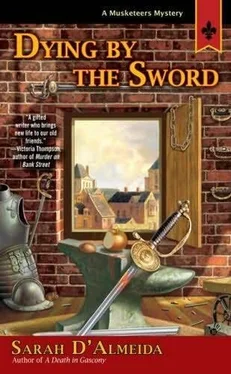Sarah D'Almeida - Dying by the Sword
Здесь есть возможность читать онлайн «Sarah D'Almeida - Dying by the Sword» весь текст электронной книги совершенно бесплатно (целиком полную версию без сокращений). В некоторых случаях можно слушать аудио, скачать через торрент в формате fb2 и присутствует краткое содержание. Жанр: Триллер, на английском языке. Описание произведения, (предисловие) а так же отзывы посетителей доступны на портале библиотеки ЛибКат.
- Название:Dying by the Sword
- Автор:
- Жанр:
- Год:неизвестен
- ISBN:нет данных
- Рейтинг книги:4 / 5. Голосов: 1
-
Избранное:Добавить в избранное
- Отзывы:
-
Ваша оценка:
- 80
- 1
- 2
- 3
- 4
- 5
Dying by the Sword: краткое содержание, описание и аннотация
Предлагаем к чтению аннотацию, описание, краткое содержание или предисловие (зависит от того, что написал сам автор книги «Dying by the Sword»). Если вы не нашли необходимую информацию о книге — напишите в комментариях, мы постараемся отыскать её.
As the Four Musketeers race to save Porthos's servant from the gallows, they run afoul of Cardinal Richelieu, who is investigating a far more serious matter – a plot against the life of the king.
Dying by the Sword — читать онлайн бесплатно полную книгу (весь текст) целиком
Ниже представлен текст книги, разбитый по страницам. Система сохранения места последней прочитанной страницы, позволяет с удобством читать онлайн бесплатно книгу «Dying by the Sword», без необходимости каждый раз заново искать на чём Вы остановились. Поставьте закладку, и сможете в любой момент перейти на страницу, на которой закончили чтение.
Интервал:
Закладка:
“And so no one will hear our conversation tonight?” Hermengarde asked, sagely.
“Exactly, my dear,” he said. “No one.”
He led her to the bench and they sat, the marble’s ice-cold temperature seeping through his venetians and his underwear and settling like a chill upon his whole body. “Now,” he said, softly, in the tone he’d been told he should use for confessions, and which he’d used, to much good effect, to talk to women in all walks of life. “Tell me what you know of Mousqueton and the armorer. You said you didn’t want for this to happen. As I don’t doubt you didn’t. But what do you think happened, and why?”
“Oh,” she said. And then, quickly. “They said that Mousqueton killed Monsieur Langelier père.”
“They said… and do you believe it?”
“Oh, no,” Hermengarde said, hastily. “At least, if he killed someone, it would have been Pierre Langelier.”
“ Pierre Langelier?” Aramis asked.
“The son,” Hermengarde said, and blushed.
“You know Monsieur Langelier’s son?”
“Yes, of course,” she said, as if it were a strange thing for him to ask her. “I was born in that street, you see. My parents live a few doors down from Monsieur Langelier. My father is a smith. It was only because my godmother, Madame du Pontus, is the palace’s fifth housekeeper, that I had the good fortune to be appointed to this post.”
Aramis, who had more than once seen her duck food, or worse, flung by the noble guests of the sovereign wondered how she could call it her good fortune without irony. But then he didn’t know how much worse her life would have been without such preferment, so he said nothing about it. Instead, he asked, “And Monsieur Pierre Langelierfils?”
“Oh, he wanted to marry me. And my parents approved of it, because they know his parents and… and he stands to inherit the armory… or I guess has inherited it now. And… you see… Mousqueton doesn’t even know who his parents are. His first memories are of running wild on the street, purse cutting and…” She blushed. “Oh, I know he is fortunate and that his position with your friend cannot lead to anything less than great recognition and fortune, but… But…” Her lips trembled. “My parents didn’t view it that way.”
“I see. So, they wanted you to accept Monsieur Pierre Langelier’s suit.”
“Oh yes. Oh, very much so. And the last time I talked to Mousqueton, you see… I told him I didn’t think we should see each other again, and he left in a fury. I told him I could not help but do what my parents wanted, and that my parents wanted me to marry Pierre. He… he accused me of wanting to marry Pierre. He said Pierre and I…” She blushed. “He accused me of things I’m sure I’ve never done. Not with anyone but Mousqueton.”
“I see,” Aramis said, though he did not in fact see much of anything, except that this made things worse for Mousqueton.
Hermengarde looked up and seemed to read his expression. “But no, monsieur, you can’t think that. You can’t believe it. Because you see, Monsieur Langelier père had snow-white hair, and Pierre has blond hair. Golden, like yours, monsieur. And he’s almost as elegant as you are, monsieur. He was a late-born son. Even in the darkness of the room with only the forge for light, it would be obvious they were not the same person.”
Aramis inclined his head, not to let her see his expression darken still further. That was true, as far as it went, and he was sure she thought she was telling him the truth and that it was impossible for Mousqueton to be guilty. But what if he had come to demand that the father refuse his son consent to marry Hermengarde? And what if the father had refused? He’d seen the way Mousqueton spoke of Hermengarde and if they had been intimate, as her words seemed to imply…
Men did all sorts of stupid and criminal things for women they loved. He’d all but cut himself from the living for the sake of his lost Violette. And look at Athos. If Aramis read his hints right, Athos’s entire life had been blighted by his love for a woman who had duped him into marrying her. And at young D’Artagnan, involved in a complex affair with his landlord’s wife. Or sober, honest Porthos, who went to Mass even more often than Aramis, but who committed regular adultery with his Athenais, the notary’s wife. There was no explanation for it, and no inequity to which a man in love would not stoop and consider himself justified.
“And the other thing,” Hermengarde said, her voice rising defiantly. “Is that he had no reason at all to kill Monsieur Langelier, because I’d sent him a note just this morning.” She sniffed, and wiped her nose with the handkerchief he’d given her, which looked like a repulsive mess now. “You know… I’ve… that is, I found that my monthly course was missed, and it could only be Mousqueton’s. So I told him I would marry him as soon as he cared to make me an offer.” She sniffed again. “So it makes no sense at all he should do this.”
To Aramis too, this made no sense at all. Oh, he supposed Mousqueton’s enemies could say that he had lost his mind and sought to steal the sword to use the money from its sale to finance his marriage to Hermengarde. In fact, he could not imagine how she thought they would live on Mousqueton’s very irregular salary.
But then he thought if she married before the pregnancy became obvious, there was no reason at all that she couldn’t continue working after the brat’s birth. She’d just give it to nurse to her relatives, or to a hired maid. There were those who took them in by the dozen, and while one heard horror stories, most of the children survived with little outward injury.
And Mousqueton would have continued to live with Porthos. And more likely than not, Porthos would become a fond almost-grandfather to the child. Aramis could see it all in his mind’s eye. He could see Porthos, fond of the little one, and sacrificing a bit of his self-indulgence to keep the young couple happy.
They would be no worse off than Madame Bonacieux, D’Artagnan’s lover, who was a personal maid to Queen Anne of Austria and could leave the palace no more than a few nights a week. Though truth be told far more often than she told her husband that her mistress could spare her, because most of the time, she took a detour up D’Artagnan’s stairs, and into the young man’s bed.
Aramis sighed heavily, thinking of D’Artagnan’s love. Athos was known to say the youth lived in a fool’s paradise, but Aramis wished he had his paradise back, fool’s or not. “I see,” he said. “And this note you sent to him?”
“Yes,” Hermengarde said. “And I had his answer by present.” She smiled. “Monsieur Porthos taught him to write, but I must say his handwriting is abominable. And his spelling.” She smiled more broadly. “You see, I learned to write, myself. Some ladies opened a school and taught the children. But I can say Mousqueton…”
“Spells and traces his letters like Porthos,” Aramis said, amused.
“No, really? But it is often that way, when you have these big men, with their way… I bet Monsieur Porthos was too restless to sit and learn his letters when he was little.”
Aramis didn’t think there was any need to tell her that the truth was that monsieur’s old and crusty father found it unnecessary for his son to learn to write and, in fact, believed that such gifts could emasculate his tall, redheaded son. “And what did the note say?”
“He said he would request my hand of me tonight and of my father tomorrow. You see?” She looked up at Aramis, tears trembling in her eyes. “There was no reason at all for him to kill poor Monsieur Langelier père. I can’t think why he should do such a thing.”
Читать дальшеИнтервал:
Закладка:
Похожие книги на «Dying by the Sword»
Представляем Вашему вниманию похожие книги на «Dying by the Sword» списком для выбора. Мы отобрали схожую по названию и смыслу литературу в надежде предоставить читателям больше вариантов отыскать новые, интересные, ещё непрочитанные произведения.
Обсуждение, отзывы о книге «Dying by the Sword» и просто собственные мнения читателей. Оставьте ваши комментарии, напишите, что Вы думаете о произведении, его смысле или главных героях. Укажите что конкретно понравилось, а что нет, и почему Вы так считаете.











